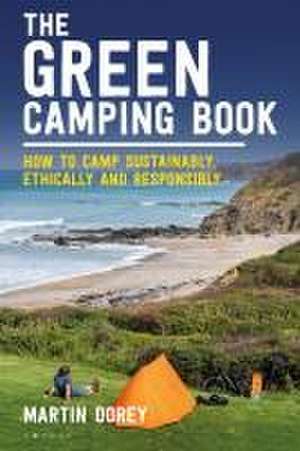The Green Camping Book: How to camp sustainably and treat our environment with respect
Autor Martin Doreyen Limba Engleză Paperback – 8 mai 2024
Preț: 115.53 lei
Preț vechi: 147.40 lei
-22% Nou
Puncte Express: 173
Preț estimativ în valută:
22.11€ • 23.64$ • 18.43£
22.11€ • 23.64$ • 18.43£
Carte disponibilă
Livrare economică 27 martie-10 aprilie
Livrare express 13-19 martie pentru 71.37 lei
Preluare comenzi: 021 569.72.76
Specificații
ISBN-13: 9781844866793
ISBN-10: 1844866793
Pagini: 288
Ilustrații: Colour photographs and illustrations
Dimensiuni: 156 x 234 x 27 mm
Greutate: 0.72 kg
Editura: Bloomsbury Publishing
Colecția Conway
Locul publicării:London, United Kingdom
ISBN-10: 1844866793
Pagini: 288
Ilustrații: Colour photographs and illustrations
Dimensiuni: 156 x 234 x 27 mm
Greutate: 0.72 kg
Editura: Bloomsbury Publishing
Colecția Conway
Locul publicării:London, United Kingdom
Caracteristici
Martin Dorey's credentials as respected camper van author and dedicated environmentalist make him the perfect person to write this book - it's The Camper Van Bible meets No. More. Plastic.
Notă biografică
Martin Dorey is a writer, surfer and lifelong camper and campervanner. In 2011 he presented the BBC2 television programme 'One Man and his Camper Van'. Martin is also a committed environmentalist and the founder of the anti-plastic charity The 2 Minute Foundation. He was its CEO from 2019 to 2022 and was the director of The Beach Clean Network from 2009 until 2019. @campervanliving; www.martindorey.com
Cuprins
WHY THIS BOOKWhy is there a need for a book like this? How camping is an industry like any other. How big is the camping industry? How much is the industry worth? What damage is the industry causing? Covers the issues of overcrowding, mass consumerism, habitat damage, chemicals in the environment.WHERE ARE YOU GOING?Where you camp and how it affects the environment. Covers wild camping, campsites and staying at home. What campsites are the best for sustainability? Why you should support campsites with good eco credentials. How to choose a perfect (green) pitch. Glamping as a sustainable alternative. Rules for wild camping. Treating the environment with respect, whether walking, cycling, kayaking. Where you can and can't go and why. Trespass law. Riparian rights. Land ownership.WHERE HAVE WE BEEN?Why looking back to look forwards might be the answer. What we can learn from our forefathers. How can we update it for tomorrow?HOW ARE YOU GETTING THERE?On foot? By bike? In the car? By train? By motorhome or campervan? What's the best way to travel and why? How you can lighten your footsteps. Why it matters. Ideas for camping without travel. Can renting be the right thing to do?WHAT ARE YOU TAKING?This section is about kit. For some campers, kit is everything, especially if they are lightweight touring or walking. WHAT ARE YOU STAYING IN?Tent? Glamping pod? Motorhome? Campervan? Why it matters and what you can do to make it as sustainable as possible. Repairing and waterproofing tents. Where we go wrong with 'single use' tents. What to look for in a new tent. How to look after your tent and keep it for longer. Tent and gear libraries. Disposing of your old tent. How to reduce the impact of your campervan or motorhome. Why thinking green will save you money? Are caravans better? Is electric better?WHAT ARE YOU WEARING?Clothing and outdoor gear is just like any other fashion item in that they are made with processes and chemicals that aren't always nice to the planet. What are the problems? What to look for and why you need to when it comes to buying gear. How do you avoid problematic camping clothes? Covers fleece and plastic technical materials, microfibres, chemicals, manufacturing, embedded carbon. Also looks at positive alternatives and green choices. Repair as a radical act. Second hand. People who can help you repair gear or redistribute it.HOW ARE YOU ACCESSORISING?Thoughts on eco friendly essentials and consumables, where to buy them and why they matter. Coconut scourers, beeswax wraps etc.WHAT ARE YOU EATING?How what you cook, what you use to cook and where you buy your groceries is relevant when it comes to camping. Eating off the land? Is it wise? Buying local. Eating out. Wasting less. Carrying lightweight food. How to make a basic trail mix and energy bar. What is the best fuel to use for cooking? What is the most lightweight way of cooking? Single use gas canisters and how to avoid/recycle. Travelling with fuel. The best fuel and cookers with the least impact.WHERE IS THE BATHROOM?How your ablutions can affect the environment and what to do about it. What to use, where to get it. Toilets and chemicals. Going wild. Avoiding plastic.HOW ARE YOU AFFECTING THE PLACES YOU GO?This chapter covers some basic rules of travel, including treating the environment with respect, disposing of waste, clearing up. Chemicals in your waste water, toilet, waste. Getting involved in local activities. Spending money locally. Having a positive effect.WHO ARE YOU TALKING TO?Standing up for what you believe in - educating others. Some ideas about the people, places and brands who are doing the right thing. The conversations we need to have with our suppliers and the people who make our stuff. Greenwashing. The other conversations we need to be having, with authorities, show organisers, MPs, government, landowners, Camping organisations. What we can expect from those conversations.How and why we must not stop calling out bad practice and supporting the good.
